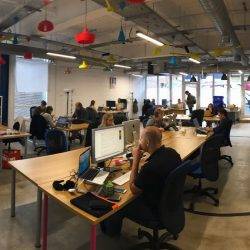January 29, 2018
New RSA report highlights increasingly precarious and diverse nature of work
 Britain is dividing into seven new classes of worker as the gig economy grows, according to think-tank the RSA (the Royal Society for the encouragement of Arts, Manufactures and Commerce). Striving, Thriving or Just About Surviving has been published to coincide with the launch of the RSA’s Future Work Centre, following RSA chief executive Matthew Taylor’s employment review for Theresa May last year. The report warns of a 30:40:30 society: while around 30 percent live comfortably, economic insecurity is “the new normal” with 40 percent just managing and a bottom 30 percent not managing to get by.
Britain is dividing into seven new classes of worker as the gig economy grows, according to think-tank the RSA (the Royal Society for the encouragement of Arts, Manufactures and Commerce). Striving, Thriving or Just About Surviving has been published to coincide with the launch of the RSA’s Future Work Centre, following RSA chief executive Matthew Taylor’s employment review for Theresa May last year. The report warns of a 30:40:30 society: while around 30 percent live comfortably, economic insecurity is “the new normal” with 40 percent just managing and a bottom 30 percent not managing to get by.








 Managers are working an extra 44 days a year over and above their contracted hours, up from 40 days in 2015. These long hours are taking their toll, causing a surge in sick leave amongst managers suffering from stress and mental ill health, claims the Chartered Management Institute (CMI), which is calling on UK employers to provide greater support. Long hours and constant communication are having a detrimental effect on the wellbeing of managers it argues resulting in one in ten managers taking time off for mental health in the last year, and for those who do take time out, it’s for an average of 12 days. Of the 1,037 managers surveyed for the report, the average boss puts in an extra day each week. This is an extra 7.5 hours beyond their contracted weekly hours (44.4 hours actual compared to 37.3 contracted), adding up to an extra 43.8 days over the course of the year. This is up from 39.6 days in 2015. The rising gap between contracted and actual hours of work is in addition to an ‘always on’ digital culture, with 59 percent of managers saying they ‘frequently’ check their emails outside of work – up from 54 percent in 2015.
Managers are working an extra 44 days a year over and above their contracted hours, up from 40 days in 2015. These long hours are taking their toll, causing a surge in sick leave amongst managers suffering from stress and mental ill health, claims the Chartered Management Institute (CMI), which is calling on UK employers to provide greater support. Long hours and constant communication are having a detrimental effect on the wellbeing of managers it argues resulting in one in ten managers taking time off for mental health in the last year, and for those who do take time out, it’s for an average of 12 days. Of the 1,037 managers surveyed for the report, the average boss puts in an extra day each week. This is an extra 7.5 hours beyond their contracted weekly hours (44.4 hours actual compared to 37.3 contracted), adding up to an extra 43.8 days over the course of the year. This is up from 39.6 days in 2015. The rising gap between contracted and actual hours of work is in addition to an ‘always on’ digital culture, with 59 percent of managers saying they ‘frequently’ check their emails outside of work – up from 54 percent in 2015.








 Two-thirds (64 percent) of employees have gone to work despite being unwell over the last 12 months, claims a new survey which found that a quarter (26 percent) of people worried that their absence will be a burden on their team. The research by Bupa shows that more than one in four (27 percent) employees ignore their doctor’s orders to stay at home and ‘soldier on’. A third of employees would go to work despite back pain or issues related to their joints and, disturbingly, a similar number (29 percent) head to work when suffering from mental health issues such as depression. As two of the most common reasons to be signed off work, Bupa’s experts fear these employees risk worsening their health, increasing the likelihood that they’ll need a prolonged period of time off work further down the line. The findings come at a time when increasing productivity is a strategic goal for most business leaders in 2018. But high levels of ‘presenteeism’ are in fact associated with loss of productivity and reduced performance – as employees who push themselves into work when unwell, risk delaying their own recovery
Two-thirds (64 percent) of employees have gone to work despite being unwell over the last 12 months, claims a new survey which found that a quarter (26 percent) of people worried that their absence will be a burden on their team. The research by Bupa shows that more than one in four (27 percent) employees ignore their doctor’s orders to stay at home and ‘soldier on’. A third of employees would go to work despite back pain or issues related to their joints and, disturbingly, a similar number (29 percent) head to work when suffering from mental health issues such as depression. As two of the most common reasons to be signed off work, Bupa’s experts fear these employees risk worsening their health, increasing the likelihood that they’ll need a prolonged period of time off work further down the line. The findings come at a time when increasing productivity is a strategic goal for most business leaders in 2018. But high levels of ‘presenteeism’ are in fact associated with loss of productivity and reduced performance – as employees who push themselves into work when unwell, risk delaying their own recovery


 There has been a rise in the number of people who believe businesses in the UK have a good reputation, with a significant number of younger people helping to create this positive picture. The research, comparing perceptions of businesses between May and November 2017, reveals 2 in 3 people think UK businesses have a good reputation, up 7 percent in 6 months. The tracker, conducted by the CBI in partnership with global PR agency, Porter Novelli, and research company, Opinium, revealed that the public are more aware of the value business provides in local communities with an increasingly vocal business community emerging in recent months. Importantly, the improvement in business reputation has largely been driven by young people and those in work, with a significant 15 percent rise in positive views among 18-34 year olds. This reinforces the view that younger people are more engaged in the debate about the UK’s future, with the Brexit negotiations and a sharper political debate intensifying the focus on jobs and the economy.
There has been a rise in the number of people who believe businesses in the UK have a good reputation, with a significant number of younger people helping to create this positive picture. The research, comparing perceptions of businesses between May and November 2017, reveals 2 in 3 people think UK businesses have a good reputation, up 7 percent in 6 months. The tracker, conducted by the CBI in partnership with global PR agency, Porter Novelli, and research company, Opinium, revealed that the public are more aware of the value business provides in local communities with an increasingly vocal business community emerging in recent months. Importantly, the improvement in business reputation has largely been driven by young people and those in work, with a significant 15 percent rise in positive views among 18-34 year olds. This reinforces the view that younger people are more engaged in the debate about the UK’s future, with the Brexit negotiations and a sharper political debate intensifying the focus on jobs and the economy.











February 5, 2018
Developing a cultured nose for what makes workplace design great
by Steve Brewer • Comment, Workplace design
More →